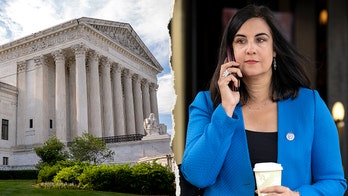Fox News Flash top headlines for September 3
Fox News Flash top headlines are here. Check out what's clicking on Foxnews.com.
The Senate Judiciary Committee announced Friday that it will hold a hearing about the Supreme Court's ruling on a Texas abortion law this week as well as its alleged abuse of the "shadow docket" through which the court handles emergency appeals and petitions.
"The Supreme Court must operate with the highest regard for judicial integrity in order to earn the public’s trust," Judiciary Committee Chairman Dick Durbin, D-Ill., said. "This anti-choice law is a devastating blow to Americans' constitutional rights—and the Court allowed it to see the light of day without public deliberation or transparency. At a time when public confidence in government institutions has greatly eroded, we must examine not just the constitutional impact of allowing the Texas law to take effect, but also the conservative Court’s abuse of the shadow docket."
The hearing announcement Friday was in reaction to the Supreme Court's denial of a request by opponents of a Texas law banning most abortions to have the law temporarily blocked while litigation against it makes its way through the courts. But the court declined to do so, leaving the law in effect in what Democrats decried as a major blow to women's rights.
Major "shadow docket" cases in recent months have included state COVID-19 regulations – like attendance limits at churches – and the Biden administration's eviction moratorium.

Sen. Dick Durbin, D-Ill., speaks before the Senate Judiciary Committee on the fourth day of hearings on Supreme Court nominee Amy Coney Barrett, Thursday, Oct. 15, 2020, on Capitol Hill in Washington. Durbin announced a hearing Friday looking into the Supreme Court's refusal to block the enforcement of a Texas abortion law. (AP Photo/Susan Walsh, Pool) (AP Photo/Susan Walsh, Pool)
ON TEXAS ABORTION RULING, JOHN ROBERTS AGAIN SPLITS WITH CONSERVATIVE JUSTICES
Emergency applications make their way up through the federal courts over the course of days and weeks rather than months and years, allowing the justices to weigh in on major time-sensitive issues, including whether to block a controversial law or regulation pending further litigation. But the "shadow docket" cases are decided merely through briefs rather than with full oral arguments like the court's normal docket.
Justice Elena Kagan, in a dissent on the 5-4 ruling allowing the Texas law to go into effect, lamented that "[w]ithout full briefing or argument, and after less than 72 hours’ thought, this Court greenlights the operation of Texas’s patently unconstitutional law banning most abortions."
"Today’s ruling illustrates just how far the Court’s ‘shadow-docket’ decisions may depart from the usual principles of appellate process," she added. "The majority has acted without any guidance from the Court of Appeals—which is right now considering the same issues. It has reviewed only the most cursory party submissions, and then only hastily."
It's unclear when the committee plans to hold the hearing.
Right-leaning court watchers, meanwhile, said the court rightly decided the procedural issue in front of it – which was not about the merits of the law or the Roe v. Wade precedent – and dismissed handwringing about the "shadow docket."
CLICK HERE TO GET THE FOX NEWS APP
"Complaints that Court ruled on Texas law in ‘shadow docket’ can't be taken seriously, as it's abortion providers who pressed for immediate action (after waiting 2-1/2 months to file motion for preliminary injunction)," Ed Whelan, the Ethics and Public Policy Center chair in constitutional studies, said on Twitter.
"Abortion providers failed to meet their burden on the ‘complex and novel antecedent procedural questions’ that their *pre-enforcement* challenge presents," Whelan added.














































